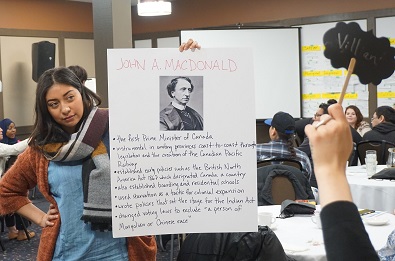One of the activities at the workshop held at the Prince Albert Inn on Tuesday. Photo by Chelsea Laskowski.
A number of workshops across the province are asking uncomfortable questions, all in the name of reconciliation.
They’re asking things like “was the first prime minister of Canada, John A Macdonald, a villain or a hero?”
On the one hand, he was instrumental in uniting province coast to coast and was crucial to the creation of Canada, but on the other hand he established boarding and Indian Residential Schools and used starvation as a tactic to create more room for settlers.
That was the message a group of about 30 people at the Youth Speak Reconciliation event in Prince Albert heard on Tuesday before unanimously voting Macdonald as a villain. They proceeded to answer the villain or hero question with regards to the Royal Canadian Mounted Police, Louis Riel, and the Hudson Bay Company.
An organizer of the event told the group why they’re stirring the pot.
“It’s uncomfortable and it’s frustrating, but it is important to embrace the complexity of all of this, all the tiny little things that people disagree on because just being like ‘oh that’s good or that’s bad,’ or ‘I’m for this and I’m not for that,’ is not going to get us anywhere fundamentally,” she said.
The event is being hosted by the Office of the Treaty Commissioner (OTC) along with a group called Canadian Roots after a number of events in southern Saskatchewan earlier this month. The Prince Albert stop focused on hearing from young people from northern Saskatchewan.
OTC director of reconciliation and community partnerships Rhett Sangster said they’re trying to find a way forward as a society.
“We have a divided history in Canada, and how do we build a history that is along the treaty relationships where we all benefit from this land and from our cultures and our heritages. There’s an extreme richness there and how do we benefit from that so everybody can do well going forward?” he said.
The group made use of cell phone videos, asking each group of about five people to create a video sharing their vision of reconciliation. Sangster said the feedback at workshops like this will guide their direction in the future.
But even though there are long-term plans, attendee Angela Sayese says it’s already motivating her to make changes with her peers to honour treaty relationships.
Nathan Murphy Sandypoint, originally from Black Lake and currently living in Prince Albert, said events like this show there are more than enough Indigenous people in the province who break stereotypes that other groups of people may have.
